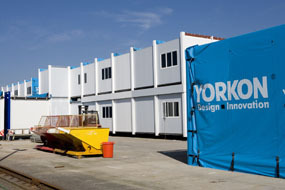04 April 2011
Yorkon Increases Recycling Rates in its Off-site Manufacturing Process to 91%
Award-winning off-site construction specialist, Yorkon, has announced that it now recycles 91 per cent of waste generated in the manufacture of its steel-framed modular building system.
According to WRAP, the construction industry is responsible for around 120 million tonnes of construction, demolition and excavation waste every year - around one third of all waste in the UK - but also that off-site construction can reduce waste by up to 90 per cent.
Yorkon recycles 91 per cent of waste at its production centre in York, and the new materials used to manufacture Yorkon buildings now have a recycled content of 35 per cent, which ensures significantly lower levels of embodied energy. Yorkon is also committed to using building products in its modular schemes which are both low carbon and have low embodied energy.
Each year the company's target for waste segregation and recycling away from landfill has been increased and exceeded. A colour-coded waste segregation system is in place that has been extended to include vinyl flooring and plasterboard. There are now 18 clearly defined waste streams, many of which are not possible to segregate for recycling on site.
Waste management plans are also in place on every site where Yorkon is the principal contractor. During construction of the Emersons Green NHS Treatment Centre - the largest complete hospital to be built off site - waste was reported monthly on the site and an average recycling rate of 92 per cent was achieved, diverting waste materials such as timber, packaging and plasterboard from landfill.
Commenting on the drive to reduce waste both in the factory and on site, David Johnson, Director and General Manager of Yorkon, said "We have seen huge reductions in waste over the past three years as a result of our ongoing programme to re-use and recycle materials and by engineering waste-generating operations out of the manufacturing process."
"It is essential that contractors, architects and manufacturers across the construction industry continue to focus on this issue and improve sustainability across their operations."
Conditions for recycling and waste minimisation are far easier in a purpose-designed manufacturing centre than on a building site. The factory is equipped with extensive lifting facilities so materials can be handled in larger and more appropriate sizes to reduce the need for cutting and trimming. Skilled staff also work at a constant temperature in the factory whereas operatives can get cold and wet on a building site, which decreases dexterity and has a negative impact on material wastage, product damage and segregation for recycling.
The Yorkon off-site building system is a highly sustainable method of construction. Buildings are manufactured to more consistently rigorous tolerances than conventional site-based building methods. In full-scale independent tests for air permeability, the Yorkon building system exceeds Building Regulations Part L 2010 requirements by up to 70 per cent with no adaptation to the standard system. This means exceptional energy efficiency performance, reduced carbon emissions and lower running costs.
Yorkon is part of the Portakabin Group.
Editor's Notes
The Yorkon off-site approach is highly sustainable. Its environmental features include:
- Reduced energy consumption. Up to 67 per cent less energy is required to produce a modular building compared to an equivalent traditionally-built project (source: Arup)
- Reduced congestion and carbon emissions. Off-site construction generates up to 90 per cent fewer vehicle movements to site (source: Mtech)
- Environmental policy. Yorkon, as part of Portakabin, was one of the first modular manufacturers to achieve ISO 14001 accreditation - the internationally recognised standard for reducing impact on the environment
- Carbon emission reductions. Yorkon, as part of Portakabin, has achieved a 12 per cent reduction in carbon emissions in the manufacturing process over the past three years

